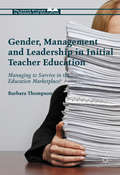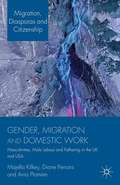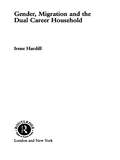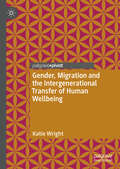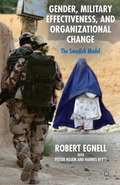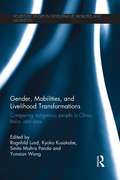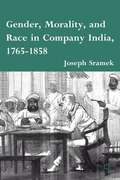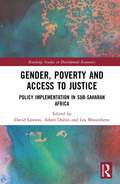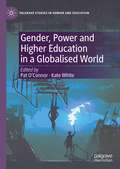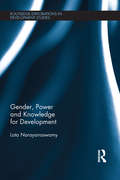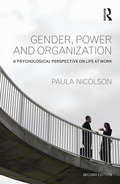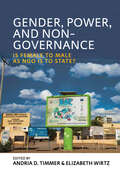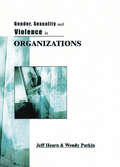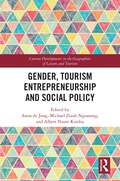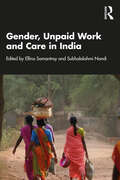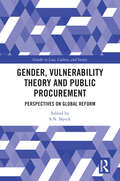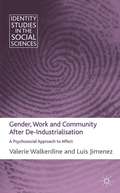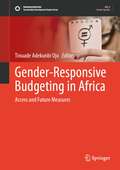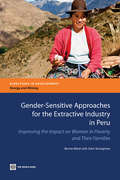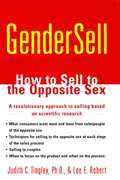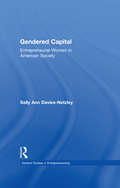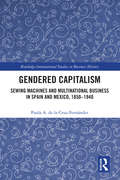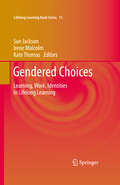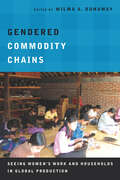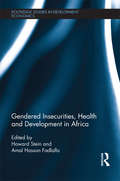- Table View
- List View
Gender, Management and Leadership in Initial Teacher Education: Managing to Survive in the Education Marketplace? (Palgrave Studies in Gender and Education)
by Barbara ThompsonThis book highlights the difficulties that women working as managers and leaders in initial teacher education face. Teacher education is at the forefront of education reforms and yet little is known about the professional lives of those who work within it. Whereas many women are moving into positions of authority in teacher training, some existing women managers are being marginalized within new internally differentiated layers of managerial structures. Yet other female managers, mainly new appointees, seem to endorse the discourses associated with new managerialist practices. Simultaneously some women who manage in teacher training are engaged in a struggle for survival individually and professionally. In the main, men seem to be missing from authority positions and will conclude that, in the current climate, the management of teacher training is ‘no job for a man’.
Gender, Migration and Domestic Work
by Pierrette Hondagneu-Sotelo Ania Plomien Majella Kilkey Diane Perrons Hernan RamirezBased on studies conducted in the UK and USA, this book investigates the experiences of suppliers and consumers of masculinized domestic services, exploring issues such as increasing inequality, migration, the rise of commoditized domestic services, contemporary masculinities and the gendering of paid work.
Gender, Migration and the Dual Career Household (Routledge International Studies of Women and Place #Vol. 4)
by Irene HardillThis book explores the gender issues associated with international migration in dual career households. Adopting a feminist approach, the author links research in economics, sociology, management and business and human geography to explore post-industrial managerial and professional careers. Particular emphasis is placed on the way in which social mobility and spatial mobility are entwined. The author explores the location and mobility decisions of dual career households, examining their personal and household biographies as well as published statistics. Of essential interest to scholars of human geography, sociology and gender studies, this book will also interest those working in organizational, migration and urban studies.
Gender, Migration and the Intergenerational Transfer of Human Wellbeing
by Katie WrightThis book discusses how human wellbeing is constructed and transferred intergenerationally in the context of international migration. Research on intergenerational transmission (IGT) has tended to focus on material asset transfers prompting calls to balance material asset analysis with that of psychosocial assets – including norms, values attitudes and behaviors. Drawing on empirical research undertaken with Latin American migrants in London, Katie Wright sets out to redress the balance by examining how far psychosocial transfers may be used as a buffer to mediate the material deprivations that migrants face via adoption of a gender, life course and human wellbeing perspective.
Gender, Military Effectiveness, and Organizational Change
by Robert Egnell Petter Hojem Hannes BertsThrough extensive analysis of the Swedish Armed Forces this study explores the possibilities and pitfalls of implementing of a gender perspective in military organizations and operations. It established a number of important lessons for similar attempts in other countries and discusses the continued process of implementation in the Swedish military
Gender, Mobilities, and Livelihood Transformations: Comparing Indigenous People in China, India, and Laos (Routledge Studies in Development, Mobilities and Migration)
by Kyoko Kusakabe Ragnhild Lund Smita Mishra Panda Yunxian WangIn the era of globalization many minority populations are subject to marginalization and expulsion from their traditional habitats due to rapid economic restructuring and changing politico-spatial relations. This book presents an analytical framework for understanding how mobility is an inherent part of such changes. The book demonstrates how current neoliberal policies are making people increasingly on the move – whether voluntarily or forced, and whether individually, as family, or as whole communities – and how such mobility is changing the livelihoods of indigenous people, with particular focus on how these transformations are gendered. It queries how state policies and cross-border and cross-regional connections have shaped and redefined the livelihood patterns, rights and citizenship, identities, and gender relations of indigenous peoples. It also identifies the dynamic changes that indigenous men and women are facing, given rapid infrastructure improvements and commercialization and/or industrialization in their places of Environment. With a focus on mobility, this innovative book gives students and researchers in development studies, gender studies, human geography, anthropology and Asian studies a more realistic assessment of peoples livelihood choices under a time of rapid transformation, and the knowledge produced may add value to present development policies and practices.
Gender, Morality, and Race in Company India, 1765-1858
by Joseph SramekBetween 1765 and 1858, British imperialists in India obsessed continuously about gaining and preserving Indian "opinion" of British moral and racial prestige. Weaving political, intellectual, cultural, and gender history together in an innovative approach, "Gender, Morality, and Race in Company India, 1765-1858" examines imperial anxieties regarding British moral misconduct in India ranging from debt and gift giving to drunkenness and irreligion and points out their wider relationship to the structuring of British colonialism. Showing a pervasive fear among imperial elites of losing "mastery" over India, as well as a deep distrust of Indian civil and military subordinates through whom they ruled, Sramek demonstrates how much of the British Raj's notable racial arrogance after 1858 can in fact be traced back into the preceding Company period of colonial rule. Rather than the Sepoy Rebellion of 1857 ushering in a more racist form of colonialism, this book powerfully suggests far greater continuity between the two periods of colonial rule than scholars have hitherto generally recognized. "
Gender, Poverty and Access to Justice: Policy Implementation in Sub-Saharan Africa (Routledge Studies in Development Economics)
by David Lawson Adam Dubin Lea MwambeneAccess to justice is a fundamental right guaranteed under a wide body of international, regional and domestic law. It is also an essential component of development policies which seek to adequately respond to the multidimensional deprivations faced by the poor in order to improve socio-economic well-being and advance the progress of the Sustainable Development Goals. Women and children make up most of Africa’s poorest and most marginalized population, and as such are often prevented from enforcing rights or seeking other recourse. This book explores and analyzes the issue of gendered access to justice, poverty and disempowerment across Sub-Saharan Africa (SSA), and provides policy discussions on the integration of gender in justice programming. Through individual country case studies, the book focuses on the challenges, obstacles and successes of developing and implementing gender focused access to justice policies and programming in the region. This multidisciplinary volume will be of interest to policy makers as well as scholars and researchers focusing on poverty and gender policy across law, economics and global development in Sub-Saharan Africa. Additionally, the volume provides policy discussion applicable in other geographical areas where access to justice is elusive for the poor and marginalized.
Gender, Power and Higher Education in a Globalised World (Palgrave Studies in Gender and Education)
by Kate White Pat O’ConnorThis book examines persistent gender inequality in higher education, and asks what is preventing change from occurring. The editors and contributors argue that organizational resistance to gender equality is the key explanation; reflected in the endorsement of discourses such as excellence, choice, distorted intersectionality, revitalized biological essentialism and gender neutrality. These discourses implicitly and explicitly depict the status quo as appropriate, reasonable and fair: ultimately impeding efforts and attempts to promote gender equality. Drawing on research from around the world, this book explores the limits and possibilities of challenging these harmful discourses, focusing on the state and universities themselves as levers for change. It stresses the importance of institutional transformation, the vital contribution of feminist activists and the importance of women’s deceptively ‘small victories’ in the academy.
Gender, Power and Knowledge for Development (Routledge Explorations in Development Studies)
by Lata NarayanaswamyKnowledge-for-development is under-theorised and under-researched within development studies, but as a set of policy objectives it is thriving within development practice. Donors and other agencies are striving to improve the flow of information within and between decision-makers and so-called ‘poor and marginalized groups’ in order to promote economic and social development, including the empowerment of women. Gender, Power and Knowledge for Development questions the assumptions and practice of the knowledge-for-development industry. Using a qualitative, multi-site ethnographical study of a Northern-based gender information service and its ‘beneficiaries’ in India, the book queries the utility of the knowledge paradigm itself and the underlying assumption that a knowledge deficit exists in the Global South. It questions the value of practices designed to address this presumed deficit that seek to increase information without addressing the specific problems of the knowledge systems being targeted for support. After reviewing the evidence, the book recommends that international organisations, governments and practitioners move away from the belief that information intermediaries can employ progressive correctives to ‘tinker at the edges’ and thus resolve the shortcomings of on-going attempts to use knowledge alone as a driver of development. Gender, Power and Knowledge for Development will be of great interest to researchers, students in development studies, gender studies, and communication studies as well as INGOs, donor agencies and groups engaged in information for development (i4D), ICT for development (ICT4D), Tech4Dev, knowledge mobilization and knowledge-for-development (K4D).
Gender, Power and Organization: A psychological perspective on life at work
by Paula NicolsonWork organizations are a major site of gender politics for professional women and men, and although there are more women in senior positions than ever before, these increased opportunities have not been gained without psychological consequences. Evidence-based and theoretically driven, the new edition of Gender, Power and Organization raises important questions about gender and power in the workplace, and the psychology of women’s advancement. Twenty years on from the first edition, it re-examines gender relations at work and asks why, despite many years of feminist critique and action, we are able to understand the dynamics of the workplace but fail to make them more representative. The struggles women face in professional and public life remain intense, not least because many men experience an increasing sense of threat to their long-term aspirations and professional positions. Using examples from recent research and the author's own consultancy experience, this important volume offers a fresh exploration of the psychology of gender and power at work, from the development of gender identities and roles, to explanations of bullying and sexual harassment in the organization. It offers an accessible survey of the subject for professional managers and students of leadership, psychology, management, sociology, gender, and women’s studies.
Gender, Power, and Non-Governance: Is Female to Male as NGO Is to State?
by Andria D. Timmer and Elizabeth WirtzUsing Sherry Ortner’s analogy of Female/Nature, Male/Culture, this volume interrogates the gendered aspects of governance by exploring the NGO/State relationship. By examining how NGOs/States perform gendered roles and actions and the gendered divisions of labor involved in different types of institutional engagement, this volume attends to the ways in which gender and governance constitute flexible, relational, and contingent systems of power. The chapters in this volume present diverse analyses of the ways in which projects of governance both reproduce and challenge binaries.
Gender, Sexuality and Violence in Organizations: The Unspoken Forces of Organization Violations
by Jeff Hearn Wendy Parkin`This exceptionally interesting study provides an up-to-date and integrated perspective on organizations, violence, gender and sexuality. It pays particular attention to the power wielded by hierarchies of heterosexual men, and the ways in which this produces violence in different, carefully analyzed forms. This book is a major contribution to the construction of sociological and political knowledge that is not founded on the dominant definitions of heterosexual masculinities' - Professor Terrell Carver, University of Bristol `This is a wide-ranging and authoritative book. The authors draw attention to the huge amount of evidence now available that documents the gendering and sexualising processes at the core of organisational life. While they never nag about violation and inequality, they are nonetheless relentless in confronting the reader with the weight of evidence'- Professor Rosemary Pringle, University of Southampton This book brings together the themes of gender, sexuality, violence and organizations. The authors synthesize the literature and research which has been done in these fields and provide a coherent framework for understanding the interrelationship between these concepts. The importance of violence and abuse, and particularly men's violence to women, children and other men has been well established, especially through feminist and some pro-feminist research. The insights of this scholarship have rarely been applied to organizational analysis. The authors draw on this literature and their own research, as well as relevant literatures on safety and risk at work; anxiety and stress at work; organizational policies on violence; sexual harassment and bullying in organizations; and male sexuality, to provide valuable information on violence in and around organizations. Gender, Sexuality and Violence in Organizations breaks new ground in organization studies and will be essential reading for academics and students in both organization studies and all those studying issues of gender and sexuality in organizations.
Gender, Tourism Entrepreneurship and Social Policy (Current Developments in the Geographies of Leisure and Tourism)
by Albert Nsom Kimbu Anna De Jong Michael Zisuh NgoasongThis timely volume is a novel and important contribution to scholarly literature on gender and tourism entrepreneurship, utilising feminist and post‑colonial frameworks to interrogate the role of social policies in facilitating inclusive tourism entrepreneurship.Drawing on contributions and case studies from across the Global South and Global North, this multi‑disciplinary collection identifies how regional variations in governance and policy influence the experiences and potentialities of tourism entrepreneurship as a promised avenue for inclusive growth for marginalised identities. Problematizing universalised constructions of entrepreneurs as necessarily masculine, western, and driven only by economic imperatives that seek to fix and dislocate entrepreneurial support, this volume takes focus with place‑based approaches to explore the intersections between identity, tourism entrepreneurship and social policy. It is this geographically informed perspective that seeks to account for the complexity of entrepreneurial experience, and the role of social policy within this, that constitutes an original contribution to the field. The focus on gender and social policy reflects the increasing importance of tourism entrepreneurship within the context of the UNWTOs Sustainable Development Goals.This book will be a pivotal resource for students, researchers, academics and policy makers in tourism, gender studies, development studies, sustainability and business.
Gender, Unpaid Work and Care in India
by Ellina Samantroy and Subhalakshmi NandiThis book explores the paradox of women’s paid and unpaid work in India. It examines key themes including historical discourses, macroeconomic policies, employment trends, issues of tribal areas, public services and infrastructure, climate change and gendered migration and vulnerability of girl children. It highlights the play of gender norms, resource rights, identities and agency in women’s work. Building on feminist theoretical frameworks and empirical analyses from microstudies, the volume offers fresh perspectives for research and policy on women’s work in the Global South. A timely intervention, this multidisciplinary book will be useful to scholars and researchers of political economy, labour studies, women’s/gender studies, public policy, economics, development studies, sociology, South Asian studies and Global South studies. It will interest planners, policymakers, gender advocates, civil society organisations, human rights bodies and international organisations working towards ensuring gender equality and women’s rights.
Gender, Vulnerability Theory and Public Procurement: Perspectives on Global Reform (Gender in Law, Culture, and Society)
by S. N. NyeckTaking up the concept of vulnerability, this book examines the gendered impact of market-based procurement practices. In recent years, ideological shifts and real managerial constraints have forced states everywhere to rely on private resources to solve public problems. Focusing on instances where the state retains ownership of assets and rights, even if it temporarily devolves its authority to a private entity (profit or non-profit), this book uncovers the ways in which these private actors are not just suppliers of materials goods, but increasingly policy influencers. More specifically, the book focuses on the gendered dynamics within the law, policy, and practice of public procurement and investigates how vulnerability is conceptualized and coded in the process of public acquisition of works, goods, and services from private suppliers. In this book, a series of rich case studies from Africa, the Middle East, and Europe show how vulnerability theory can inform the design of public institutions that are more responsible and responsive to gender-informed demands for social justice. This first book to integrate vulnerability theory into public procurement studies in global and comparative perspectives will appeal to scholars and others with interests in gendered dynamics in law and society, international development, public policy, and international political economy.
Gender, Work and Community After De-Industrialisation
by Valerie Walkerdine Luis JimenezHow does an industrial community cope when they are told that closure is inevitable? What if this is only the last in a 200 year long line of threats, insecurities and closure? How did people weather the storms and how do they face the future now? While attempts to regenerate communities are everywhere, we do not often hear from the people themselves just how they managed to create safe collective spaces or how the fall of the whole house of cards brought with it effects which can be felt by young people who never knew the town when it was an industrial heartland. We hear the story of how men and women tried to cope and still want to retain their community in the face of its destruction. What can they and will they have to pass to the next generation and where will that leave the young people themselves, who have nothing to stay for but are unable to leave? This book examines these crucial questions facing post-industrial societies.
Gender-Responsive Budgeting in Africa: Access and Future Measures (Sustainable Development Goals Series)
by Tinuade Adekunbi OjoAfrica is the leading region in the world in the expansion of mobile money transactions, according to Global Findex. The book presents several significant themes and African states' efforts to address the political and economic factors influencing budget allocation to women-oriented programmes and projects in African communities. The book further investigates the impact of gender-responsive budgeting on women's empowerment and gender equality in these communities. The findings intend to analyse the effectiveness of the countries' approaches and share lessons that different African economies, whether currently booming or struggling, can enhance or implement toward gender budgeting response at all structural levels. Gender budgeting is an important tool in response to the growth and development of the economy. The themes identified will guide gender budgeting response, and how gender is incorporated into these approaches (if at all). The main objective of this volumeis to understand different processes of gender budgeting in response to gender issues at a national level. And to help encourage reflection on what lessons could be learnt between states and what factors cause divergence in multilateral settings so that they can be understood and hopefully addressed.
Gender-Sensitive Approaches for the Extractive Industry in Peru
by John Strongman Bernie WardLarge amounts of 'development assistance' in the form of infrastructure and social programs are annually made available to communities across Peru due the presence of extractive industry companies. These investments however do not always achieve the social development impact anticipated. As one company pointed out: "our company has invested millions of dollars in social programs in our neighboring communities, however the indicators for child malnutrition and maternal health have seen no noticeable improvement". Communities base their support or rejection for extractive industry operations by weighing up the benefits against the risks; where the risk-benefit balance sheet does not look positive, conflict is likely. Companies, and the governments who benefit from their tax revenues, therefore work hard to reduce risks and increase benefits for communities: but this report confirms an overlooked aspect of the development outcomes: men are capturing more of the benefits and these are not necessarily reaching the wider family; whereas it is the women and children who experience more of the risks that arise from the presence of extractive industry projects. The impact on women could be significantly improved by taking simple steps with little additional effort or cost - disaggregating data by sex, strengthening consultations with women, investigating issues of risk to women, improving women's access to benefits. Additionally this report challenges the "development industry" (those non-governmental organizations, community-based organizations, universities, research centers, think tanks, funders, foundations and training organizations for whom the development of theories and practices to alleviate poverty is a primary objective.) to work more closely with local government and companies, sharing its knowledge on thematic issues such as gender (and other areas such as Rights-Based Approaches or Community-Driven Development) and on programs (such as maternal health, bi-lingual education, or productive chain development) to achieve what the NGOs, civil society and local government have within their mandates to deliver, and what the EI sector seeks.
GenderSell
by Judith C. Tingley Lee E. RobertGenderSell is the first and only book to offer specific techniques on overcoming the single greatest barrier to effective sales -- selling to the opposite sex. Despite a decade of important research on how differences between the sexes affect personal and workplace relationships, until now virtually every book on selling has ignored these differences. And despite the fact that women make approximately 85 percent of the purchasing decisions on most products and services and now constitute more than 25 percent of today's sales force, nearly all relevant books have been written by men for men in sales about selling to men. Tom Peters, Ken Blanchard, and other management experts have proposed that companies must learn how to market, sell, and advertise differently to men and women in order to stay competitive. Now at long last, psychologist and workplace communication expert Judith Tingley and veteran sales professional Lee E. Robert bring you this essential guide. Based on research, including the authors' Sales Preference Survey, conducted with more than 600 participants, Tingley and Robert provide detailed examples, specific techniques, and provocative case studies that will help sales professionals increase their success, their revenues, and their profits. The authors answer many important questions: When should you focus more on the interpersonal process and when on the product? What quality do customers say they like most about men in sales? What characteristic do they think is strongest in female sales professionals? Is the timing of the close different with male and female clients? The industry buzz has begun: In response to articles on the Gendersell topic that have appeared in trade publications and to training seminars offered by the authors, executives from a wide range of industries -- high tech to automobile dealerships, insurance companies to home builders and health care delivery services -- have been clamoring for GenderSell to make it an integral part of their worldwide sales strategies.
Gendered Capital: Entrepreneurial Women in American Enterprise (Garland Studies in Entrepreneurship)
by Sally Ann Davies-NetzleyFirst Published in 2000. Routledge is an imprint of Taylor & Francis, an informa company.
Gendered Capitalism: Sewing Machines and Multinational Business in Spain and Mexico, 1850-1940 (Routledge International Studies in Business History)
by Paula A. De La Cruz-FernándezGendered Capitalism: Sewing Machines and Multinational Business in Spain and Mexico, 1850–1940 is a history of the gendered corporation, a study that examines how ideas and ideals about domesticity and the cultures of sewing and embroidery, being gender-specific, shaped the US-headquartered Singer Sewing Machine Company’s operations around the world. In contrast to production-driven and culture-neutral analyses of the multinational enterprise, this book focuses on both the supply and the demand side to argue that consumers and the cultural worlds of those—mainly women—using the sewing machine for personal purposes or for the market shaped corporate organization. This book is a global history of Singer, but it also focuses on the cases of Spain and Mexico to highlight nations where the sewing machine multinational never established manufacturing operations. Casa Singer was a mostly profitable and a long-term selling and marketing operation in both countries. Gendered Capitalism demonstrates that local Spanish and Mexican agents, both men and women, developed and expanded Singer’s selling system to the extent that the multinational company was seen as domestic, both in the location sense, and because of its focus on the private sphere of the home. By bringing the cases of Spain and Mexico, and the cultural, everyday realm of practices related to sewing and embroidery that the sewing machine was part of, to the center of the study of international business, Gendered Capitalism further reveals the layers of complexities and multitudes that conform the history of global capitalism. This book will be of interest to readers and scholars in the fields of business history, economic cultural history, management studies, international business, women’s history, gender studies, and the history of technology.
Gendered Choices
by Kate Thomas Sue Jackson Irene MalcolmThis important book breaks new ground in addressing issues of gendered learning in different contexts across the (adult) life span at the start of the 21st century. Adult learning sits within a shifting landscape of educational policy, profoundly influenced by the skills agenda, by complex funding policies, new qualifications and the widening/narrowing participation debate. The book is unique in highlighting the centrality of gendered choices to these developments which shape participation in and experiences of lifelong learning. Gendered Choices critically examines the continued expansion of a skills-based approach in areas of lifelong learning, including career decisions, professional identities and informal networks. It explores key intersections of adult learning from a gender perspective: notably participation, workplace learning and informal pathways. Drawing on research from a range of contexts, Gendered Choices demonstrates that for women the public/private spaces of work and home are often conflated, although the gendering of 'choice' has largely been ignored by policy makers. The themes of the book bring together some of these critical issues, explored through the multiple and fractured identities which constitute gendered lives. The book addresses these in an international context, with contributions from Canada, Spain and Iran that provide a wider international perspective on shared issues.
Gendered Commodity Chains: Seeing Women's Work and Households in Global Production
by Wilma A. DunawayGendered Commodity Chains is the first book to consider the fundamental role of gender in global commodity chains. It challenges long-held assumptions of global economic systems by identifying the crucial role social reproduction plays in production and by declaring the household as an important site of production. In affirming the importance of women's work in global production, this cutting-edge volume fills an important gender gap in the field of global commodity and value chain analysis. With thirteen chapters by an international group of scholars from sociology, anthropology, economics, women's studies, and geography, this volume begins with an eye-opening feminist critique of existing commodity chain literature. Throughout its remaining five parts, Gendered Commodity Chains addresses ways women's work can be integrated into commodity chain research, the forms women's labor takes, threats to social reproduction, the impact of indigenous and peasant households on commodity chains, the rapidly expanding arenas of global carework and sex trafficking, and finally, opportunities for worker resistance. This broadly interdisciplinary volume provides conceptual and methodological guides for academics, graduate students, researchers, and activists interested in the gendered nature of commodity chains.
Gendered Insecurities, Health and Development in Africa (Routledge Studies in Development Economics #97)
by Howard Stein Amal Hassan FadlallaThe concept of security has often narrowly focused on issues surrounding the protection of national borders from outside threats. However, a richer idea of human security has become increasingly important in the past decade or so. The aim is to incorporate various dimensions of the downside risks affecting the generalized well-being or dignity of people. Despite this rising prominence, the discourses surrounding human security have neglected to address the topic of gender, particularly how issues of poverty and underdevelopment impact women’s and men’s experiences and strategies differently. Since its introduction in the 1994 UNDP Human Development report, the idea of human security has become increasingly influential among academics and international development practitioners. However, gendered dimensions of human security have not attracted enough attention, despite their vital importance. Women are disproportionately more vulnerable to disease and other forms of human insecurity due to differences in entitlement, empowerment and an array of other ecological and socio-economic factors. These gendered insecurities are inextricably linked to poverty, and as a result, the feminization of poverty is a growing phenomenon worldwide. The contributors to this volume rely on a gender-focused analysis to consider a number of issues central to human security and development in Africa, including food security, environmental health risks, discrimination within judicial and legal systems, gendered aspects of HIV/AIDS transmission and treatment technologies, neoliberalism and poverty alleviation strategies, and conflict and women’s political activism. The gender focus of this volume points to the importance of power relationships and policy variability underlying human insecurities in the African context. The insights of this book offer the potential for an improved human security framework, one that embraces a more complex and context-specific analysis of the issues of risk and vulnerability, therefore expanding the capacities of the human security framework to safeguard the livelihoods of the most vulnerable populations.
